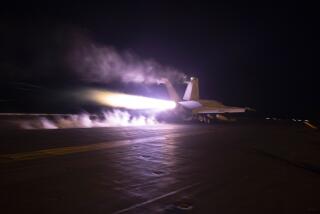Target Hussein’s Power, Not His People : Any new bombing must be tightly confined to the Iraqi dictator’s military and arsenals
- Share via
Massive air strikes failed to topple Saddam Hussein during last year’s Persian Gulf War, and there’s no reason to think that limited air attacks aimed at punishing the Iraqi dictator for his defiance of the cease-fire agreements ending that war would lead to his downfall now. Such raids nonetheless loom, and necessarily, if Baghdad does not agree promptly to meet its obligations.
The United States, Britain and France have let it be known that they are readying an ultimatum to Iraq, to be followed quickly by air attacks if its terms are rejected. What should be at the top of any allied target list? Certainly, everything possible once again must be done to spare Iraqi civilians from harm. The most attractive and legitimate targets at this point are Hussein’s air force, armored divisions and missile units. Hit them hard and the muscle that supports his regime will be weakened. Hit them hard and the loyalty of his armed forces would be further strained. Those are reasonable and achievable strategic objectives.
The U.N. inspectors who were prevented from entering the Agriculture Ministry in Baghdad, suspected repository for key records on Iraq’s weapons programs, have now been withdrawn from the country. That’s a short-term domestic propaganda victory for Hussein, but it also lifts the chance that the inspectors could be taken hostage to try to forestall new air strikes. The problem is that with the inspectors removed, Iraq may have been able to clean out the files they wanted to see. That could explain the suddenly more conciliatory stance taken late Friday by Iraq’s ambassador to the United Nations.
If military measures do become necessary , the Western allies believe that existing U.N. Security Council resolutions give them the power to act, without any need to go back to the full council for new authority. That brings closer the time when action could be taken.
The United States would once again contribute the preponderance of power to any coalition attack on Iraqi targets. The shrinkage of forces committed to Desert Storm still leaves considerable American strength in the area: planes and missiles aboard ships in the eastern Mediterranean and the Persian Gulf as well as a large air armada--including F-117 fighter-bombers--in Saudi Arabia.
The confrontation over compliance with U.N. resolutions is one that Saddam Hussein has deliberately provoked. By stalling, he may in fact have been able for now to hide from the U.N. inspectors the material they most wanted to see. None of this, however, changes the validity of the U.N. resolutions. Iraq must give up its weapons of mass destruction, all of them, or face the retaliation the Western allies are even now ready to inflict.
More to Read
Sign up for Essential California
The most important California stories and recommendations in your inbox every morning.
You may occasionally receive promotional content from the Los Angeles Times.













